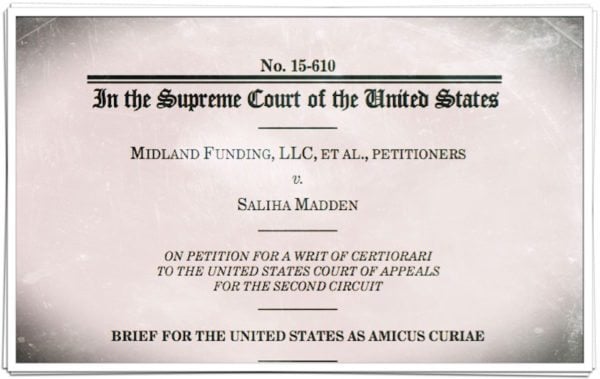After being invited to file a brief to the Supreme Court, the Solicitor General’s Office filed a brief this past Tuesday, May 24, 2016 and weighed in on the Madden v. Midland Funding, LLC case. Or rather, by weighing in I mean they blatantly shot down the Second Circuit’s holding on the matter and recommended that the Supreme Court not hear the case.
Madden v. Midland Funding LLC is a case that challenges whether the National Bank Act, which preempts state usury laws regulating the interest rate that national banks may charge on a loan, continues to have a preemptive effect after the national bank sells the loan to a third party non-bank entity. Usury laws limit the maximum interest rate that may be charged, and usually vary state by state. In this case, a national bank made a consumer loan to the plaintiff Madden and sold the note to a third party for collections. The interest rate on the loan was not usurious—or higher than allowed in that particular state—when made, but was usurious under the laws of the state in which the third party assignee was located.
 In its brief, the Solicitor General pointed to the “cardinal rule of usury” that a loan contract that is valid when it was made “can never be invalidated by any subsequent usurious transaction.” With no qualms, the Solicitor General stated that:
In its brief, the Solicitor General pointed to the “cardinal rule of usury” that a loan contract that is valid when it was made “can never be invalidated by any subsequent usurious transaction.” With no qualms, the Solicitor General stated that:
“The court of appeals’ decision is incorrect. Properly understood, a national bank’s Section 85 authority to charge interest up to the maximum permitted by its home State encompasses the power to convey to an assignee the right to enforce the interest-rate term of the agreement.”
It pointed out that review by the Supreme Court is not warranted because:
- the appeals court erred in its holding that state usury laws may validly prohibit a national bank’s assignee from enforcing the interest-rate term of a debt agreement that was valid under the law of the State in which the national bank is located;
- There’s no circuit split;
- The key aspects of the preemption analysis were not presented to the district court; and
- The petitioners may still prevail on remand—despite the error in the court of appeals’ decision.
 The Supreme Court has been requested to accept for review the Madden case. If it declines, the parties will likely go back to district court to play out the preemption arguments, but that still leaves a problematic Second Circuit decision in place.
The Supreme Court has been requested to accept for review the Madden case. If it declines, the parties will likely go back to district court to play out the preemption arguments, but that still leaves a problematic Second Circuit decision in place.
The Madden case has been followed closely by marketplace lenders, many of whom partner with a bank to offer loans. Lending Club has already filed disclosures citing some changes to its business due to the Madden v. Midland case. Meanwhile, Columbia and Fordham university researchers have published a study that examines the effect on consumer lending in states within the Second Circuit’s decision. In brief, it has found that:
While lending to borrowers with top credit scores was unaffected, we show that the [Madden] decision effectively cut off the supply of marketplace credit for borrowers with FICO scores below 650. The study’s result vindicates the teachings of Economics 101: A price cap reduces the quantity of goods supplied to consumers. Lenders unable to charge an interest rate that compensates them for borrowers’ risk, we show, will simply exit the market.
 Some have hailed the court’s decision as a victory for consumer protection. But it’s hard to see how any of this is good for consumers. After all, borrowers who cannot gain access to marketplace credit will likely choose instead higher-cost sources like credit cards with interest rates as high as 30%, making it harder to repay their debts. And because marketplace lending is subject to price caps but other lending is not, the decision is essentially a protectionist measure, giving banks a monopoly over lending to higher-risk borrowers. Competition for these borrowers’ business—not regulation that gives existing players monopoly power—is what these borrowers need.
Some have hailed the court’s decision as a victory for consumer protection. But it’s hard to see how any of this is good for consumers. After all, borrowers who cannot gain access to marketplace credit will likely choose instead higher-cost sources like credit cards with interest rates as high as 30%, making it harder to repay their debts. And because marketplace lending is subject to price caps but other lending is not, the decision is essentially a protectionist measure, giving banks a monopoly over lending to higher-risk borrowers. Competition for these borrowers’ business—not regulation that gives existing players monopoly power—is what these borrowers need.
[scribd id=313915937 key=key-FCalHHMhLbm0pxp5w5cp mode=scroll]
 Amy Wan, Esq., CIPP/US is Principal at The Law Office of Amy Wan, Esq., where she advises on startup and crowdfunding law. Formerly, she was General Counsel at Patch of Land, a real estate marketplace lending platform. While there, Amy pioneered the industry’s first payment dependent note that is secured pursuant to an indenture trustee and designed to be bankruptcy remote, and advised the company on its $20.4M Series A funding round. She was recognized as a Finalist for the Corporate Counsel of the Year Award 2015 by LA Business Journal.
Amy Wan, Esq., CIPP/US is Principal at The Law Office of Amy Wan, Esq., where she advises on startup and crowdfunding law. Formerly, she was General Counsel at Patch of Land, a real estate marketplace lending platform. While there, Amy pioneered the industry’s first payment dependent note that is secured pursuant to an indenture trustee and designed to be bankruptcy remote, and advised the company on its $20.4M Series A funding round. She was recognized as a Finalist for the Corporate Counsel of the Year Award 2015 by LA Business Journal.


